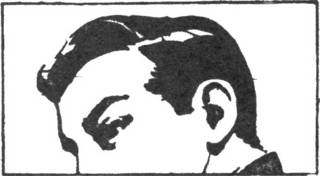There’s something about closing a word with a hard consonant that irks the Tamil speaker, so the inflections of his own language are applied to English loanwords: in Chennai, it's quite correctu to say leftu, rightu, and straightu. This linguistic tic is so common, it's become a standard feature in spoofs of South Indian English. So you have advertising slogans that claim 'Eastu, Westu, Northu, Southu, Vasthu bestu', and joke translations from the Tamil that read like this:
Moonu broughtu
tied it on the cotu
cloudu broughtu
put it on the bedu
(Sathya Sankaran, Corrupted Mind, June 30, 2005)Usage of this kind is highly informal, of course, so there's no standard way of rendering the half-vowel. One person may write tightu, another tighta. Tight-aa? on the other hand, is how you might ask a friend if he's had too much to drink: the aa tag is a separate device altogether that conveys emphasis or interrogation. (A Tamil De Niro, if such a thing existed, would stand in front of the mirror and say 'You're talking to who? I-aa?', to which the reflection would doubtless reply 'Amaa! You-e!'). I'm sure a native speaker could point out many more variations and uses of the vowel tag: this blog goes so far as to suggest, tongue in cheek, that you can get by in Chennai without any Tamil, 'all you need to survive is to put an "A" after an English word'.
example: Yogu sits in Chennai auto.
Yogu: Po!
Rajnikant Autowala: Aiyyo!!! Po whereA!?!?!
Yogu: Amma!!! Po Lefta...then Righta!!!
Rajnikant Autowala: Aha...OK ma...understanda.
Destination Reacheda.
Rajnikant Autowala: Pathu ruppes saar...
Yogu: Pathu rupees ma!?!?! Tambee!!! Vermina!!! Mongrela!!! Appa Kundee!!! Chenee rida BIG fareA!?!?! shiva shiva...
Rajnikant Autowala: Sunday ma! Shiva temble yextra farea!!!
(Yogustus Caesar, GetAFix, 17 Oct, 2004)Chico Marx in a mundu? Well, not quite. Unlike the Marx Brothers' mock-Italian, this brand of Instant Tamlish is used even when no parody is intended. You'll find it in internet forums frequented by Tamilians, where people tend to write as they speak. Here, the vowel tags merely reproduce the inflections of the spoken language. Some random examples from the TFM and Sysindia forums:
Romba correctu!Yes, that's about it. I'm going to watch TV now, see if I can catch Righta? Wronga? on the Tamil channel.
Original-a illa duplicate-aa?
Iyya naga sonna sonathu than correctu mathavanga yellam corruptu.
Anyway, ippa noveloda plot tighta irukku.
It sounds like a combo of maalkouns + chandrakouns, correctaa ?
Telugu films are stepsu, dancu & fightu. That's all.

6 comments:
The Yogustus Caesar excerpt is plain retarded. I know that's supposed to be funny(!), but a conversation like that would have the auto-driver taking you to Kilpauk.
Everything else, pretty much correctu. :)
PS: It might be worthy to mention that the suffixed -u is not pronounced 'correctoo', though I'm not sure if there is a pronunciation key that would help explain it better.
>the suffixed -u is not pronounced 'correctoo'
I did call it a half-vowel - to my untrained ears, it's shorter than a short u. As for the pronunciation key, here's a link to a site on the Phonetics of Spoken Tamil.
Sitting on top of the Vembley omnibus as I occasionally do, my ears prick up at the sounds of a different creole - made up of Hinglish, Tinglish and Punglish all compressed into something different.
What are people's thoughts on what this will turn out to be - a latter-day Hindustani or a new pidgin form of English?
Doubtless in places like Luton Hurdabi is quietly establishing a niche for itself.
Hurdabi?
Slough, Berkshire seems to be split between Urdu and Punjabi; while I imagine Hindi gets a look in further north in Luton, Bedfordshire.
There is a related wikipedia page titled "Madras Bashai" that I found quite informative and amusing.
Post a Comment